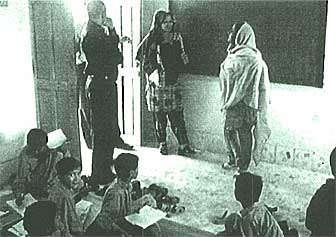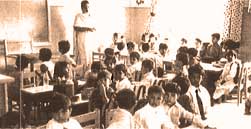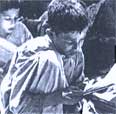|
 Former US congressman Jim Moody urges
the government not to close the National Commission For
Human
Development at this crucial juncture in the nation’s
progress Former US congressman Jim Moody urges
the government not to close the National Commission For
Human
Development at this crucial juncture in the nation’s
progress
As a strong friend of Pakistan since my
days serving here in the US Peace Corps, reinforced by frequent
official and business visits, I congratulate the new government
that represents a hopeful new chapter, and urge it to reconsider
the announced decision to de-fund the National Commission
for Human Development. The solid facts are that closing NCHD
would:
- Eliminate an informal village school network that has
to date enrolled 8,235,000 children ages 5 to 7 who would
otherwise not be in any school.
- Stop the training of 46,000 supplementary
teachers that has enabled 540,000 children to attend
insufficiently staffed government schools.
- Close 121,187 community literacy centers
that have already trained 2.86 million women to read.
- End the support of over 1 million women
volunteers going door-to-door to train mothers how to
prevent infant death through ORS and other basic interventions.
- Close the special patient welfare centers
at District Hospitals now providing medicines, blood
donations and transportation for sick or immobile patients.
- Disband over 300,000 volunteers helping
various community-improvement projects at the grassroots
level.
- Close the 16 Microsoft-assisted computer-learning
centers in remote areas such as Thatta and Badin.
I have personally
witnessed NCHD's work at the village level, from Narewal
province to the NWFP area, and was very moved as I watched
the children
learn how to read and write, as I met the voluntary workers
who go door to door helping mothers learn to prevent needless
death of their infants, as I spoke with the teachers helping
women become literate.
 Defunding
NCHD would tell international donor organisations such
as the UN Development Program,
World Bank and the Bill & Melinda Gates Foundation that their
six-year investment in this UNESCO award-winning educational
program
for children and parents in rural Pakistan has been suddenly
and inexplicably cut off—allegedly for political
reasons. Particularly puzzling since all funds have been
carefully
and continually audited by independent outside authorities,
disproving any claims of malfeasance or wastage. Defunding
NCHD would tell international donor organisations such
as the UN Development Program,
World Bank and the Bill & Melinda Gates Foundation that their
six-year investment in this UNESCO award-winning educational
program
for children and parents in rural Pakistan has been suddenly
and inexplicably cut off—allegedly for political
reasons. Particularly puzzling since all funds have been
carefully
and continually audited by independent outside authorities,
disproving any claims of malfeasance or wastage.
It will
be puzzling to international donors trying to help Pakistan
to see the new leadership seeking to direct a country expressly
pledged to uphold the principles of a great and profound
religion, Islam, cut off assistance to millions of children
who have done no more to deserve their circumstance of
birth than we more privileged did. Each of the three holy
prophets
urged us to care for the poorest among us, Mohammed (PBUH)
most recently.
Eliminating NCHD's work will deprive hundreds
of thousands of families access to fundamental health care
and education
to improve
their lives and thus increase the difficulties facing
these parents and children whom surely God loves.
Forcing
several
million children out of village schools where there
is yet no Ministry of Education presence will require many
parents to choose between illiteracy for their children
and
sending
them to madrasa schools where they will 1eam to read
but the curriculum may lack training in science, math and
other
subjects necessary to secure meaningful and sustaining
jobs
in an increasingly digitised world. Today's children
need familiarity with many subjects in addition to religious
training.
A wider point: If Pakistan's elite continues
to
live the good life
while ignoring the plight of their poorest citizens,
and now cutting off proven and effective means of their
self-improvement, it will surely deepen alienation and anger
(that even
a
non-Pakistani like me call see in the rural areas) with
dire consequences
certain to result at some point.
 There
is ample historical precedent to alarm us: 200 years
ago the upper and educated
c1asses of France ignored plight of the poorest
among them as they lived the "good life" with fine
homes, servants, lovely dinner parties. As anger
and alienation
mounted among ordinary citizens a spark finally erupted
into violence, including numerous executions of society's “betters.” The
lucky ones fled to other countries, their lives wrecked. There
is ample historical precedent to alarm us: 200 years
ago the upper and educated
c1asses of France ignored plight of the poorest
among them as they lived the "good life" with fine
homes, servants, lovely dinner parties. As anger
and alienation
mounted among ordinary citizens a spark finally erupted
into violence, including numerous executions of society's “betters.” The
lucky ones fled to other countries, their lives wrecked.
Living
in China as a child I personally witnessed a similar
scenario of the wealthy educated few living
luxurious lifestyles and ignoring the education and basic
needs of
their less fortunate citizens. The inevitable revolt,
sparked by an articulate spokesman—Mao—led
to an extremist regime starting with mass executions and
imprisonment while a lucky few fled to Taiwan never
to see their
homes again. Millions who could not
flee died under the dire and punitive regime that prevailed
for decades until the extremist system finally mellowed.
In
more recent times I also witnessed the same scenario
in Iran, Pakistan's neighbor, where the upper levels
of
society
lived lavish lifestyles while ignoring
the plight of the other 95 percent of the population and
their increasing anger. Finally that alienation boiled
over
into a revolution
led by the mullahs, and
also imposed a strict regime starting with numerous executions
severa1 of whom I personally knew. Some lucky upper
society
persons
escaped, not to return to
their beloved country until decades later if ever.
NCHID
is not only delivering tangible assistance such as
better
health
and
increased literacy in the poorest
areas, but is also fostering a spirit of self-help and voluntary
local activism. Most of all, it is raising awareness
among people in these neglected areas that
(1) they can take steps to better their own lives
and that of their children, and (2) they are cared
for and appreciated by their
Pakistani co-citizens. Nothing
could be more important at this time than increasing these
forms
of social cohesion and confidence. The eventual direction
that Pakistan takes will be increasingly
determined by how its citizens at all strata share
the same positive, inclusive vision.
We who know the generous
and sincere nature of Pakistanis,
and their unfailing and protective welcome to the
stranger, and want to see Pakistan rise to its
full potential at all levels as it both achieves
greatly and increasingly
cares for its own people. Having lived in two countries
where the fortunate few ignoring
the plight of the many led to disastrous results for
all, I cannot remain silent as I see the familiar seeds
of
a preventable disaster.
Having witnessed the pride
in Pakistan during the February election, I hope the
new government will make the healing, constructive
decision at this crucial
early moment in their time
of testing.
I respectfully urge the new government to
make the moral, wise and pragmatic decision to continue
the vital
work of NCHD.
Jim Moody is a former member of the United States Congress,
former
Vice President of the UN development agency IFAD in Rome,
Italy,
and head of the US observer delegation during Pakistan's February
election.
|